
Before the recent U.S. presidential election, Americans and Germans generally perceived the relationship between their countries as positive, according to surveys conducted in both countries by Pew Research Center and Körber-Stiftung. However, there were some differences in views on topics including bilateral partnerships, conflicts around the world and the military threat posed by China.
The joint surveys by the Center and Körber-Stiftung took place in September – before the U.S. presidential election, but between elections in the German states of Brandenburg, Saxony and Thuringia, which resulted in greater support for far-right parties. Körber-Stiftung separately conducted a follow-up survey in Germany after the U.S. election.
Here are several key findings about U.S.-German relations, based on the September surveys. It’s important to note that attitudes may have changed in the wake of the U.S. election on Nov. 5.
In 2017, Pew Research Center and Körber-Stiftung began collaborating on joint public opinion surveys to gauge relations between the United States and Germany. Topics surveyed include relations with other countries; partnerships on foreign policy issues; views of China, Russia and the Middle East conflict; democracy; the rise of emerging economies; and the state of international relations.
The questions were developed together, and each organization fielded a survey in its own country starting in 2017. Some questions have been repeated annually to track attitudes over time.
The results have been published in both countries. Here are the Center reports for November 2023, October 2022, November 2021, November 2020, May 2020, March 2020, March 2019 and February 2018. The Körber-Stiftung findings are contained within its larger “Berlin Pulse” report and can be found here for 2024 and prior years.
For the U.S. findings, Pew Research Center surveyed 1,021 adults from Sept. 20 to 29, 2024. The survey was conducted by Ipsos for Pew Research Center on the Ipsos KnowledgePanel Government & Academic Omnibus. Ipsos’ KnowledgePanel is an online survey panel recruited using address-based sampling. The survey is weighted by gender, age, race, ethnicity, education, income and other categories.
The German findings are from a Körber-Stiftung survey of 1,010 adults from Sept. 11 to 20, 2024. The survey was conducted by Kantar Public via telephone. Körber-Stiftung also conducted a follow-up survey in Germany (but not the U.S.) after the U.S. election.
Here are the questions used for this analysis, along with responses, and the U.S. survey methodology.
U.S.-Germany bilateral relations
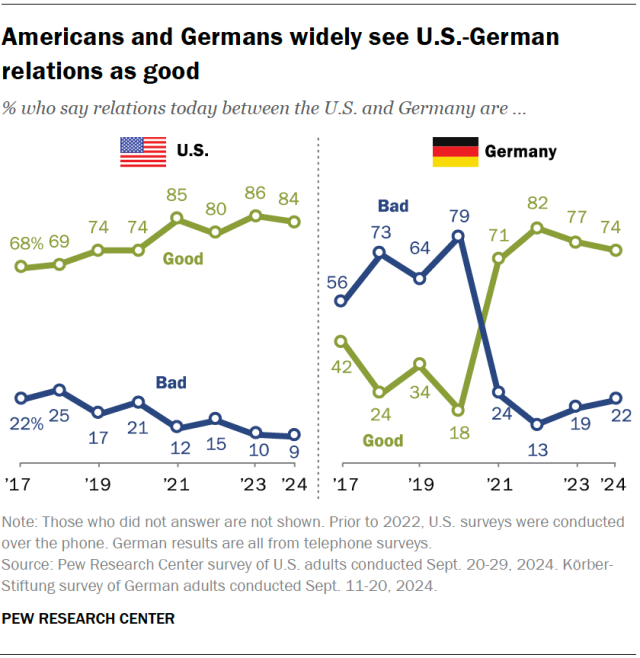
About three-in-four Germans (74%) characterize relations between the two countries as good. That’s largely driven by the two-thirds of all German respondents who say relations are somewhat good.
Most Germans have held positive views of the relationship since 2021, following the election of President Joe Biden. However, some Germans view the relationship more negatively:
- 35% of people living in the former East Germany describe relations with the U.S. as bad, compared with 19% of people living in the former West Germany.
- 44% of Germans who support the far-right Alternative for Germany party (AfD) say U.S.-German relations are bad, including 13% who say they’re very bad.
Related: 7 facts about Germany’s AfD party
Americans are more optimistic about U.S.-German relations: 84% say the relationship is good, with 23% saying it’s very good. Positive views of the relationship have steadily risen since we first asked the question in 2017.
Top foreign policy partners
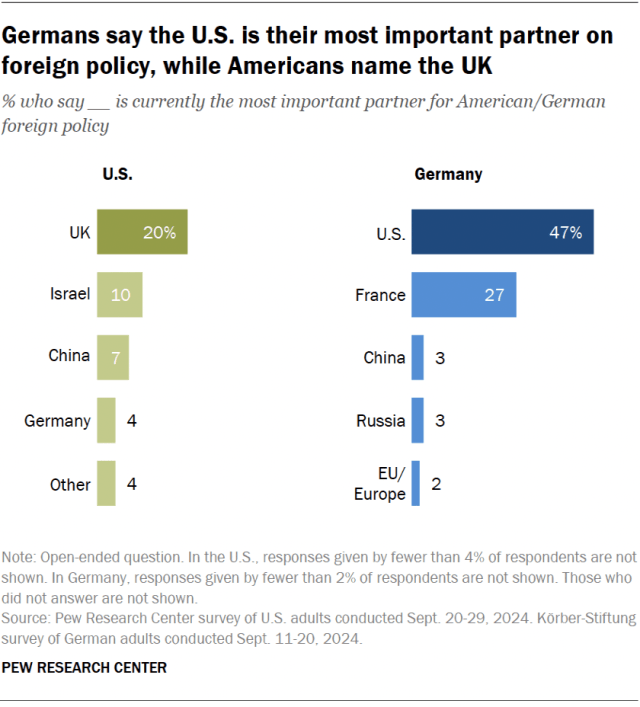
Americans continue to be most likely to view the United Kingdom as their most important partner on foreign policy. This has been the case since we first asked the question in 2017.
While 20% named the UK in the open-ended question, several other countries were mentioned. For example, one-in-ten Americans say Israel is currently the United States’ most important foreign policy partner. This is up 6 percentage points since last year.
Republicans and Republican-leaning independents are far more likely than Democrats and Democratic leaners to name Israel as America’s top foreign policy partner (21% vs. 4%).
An additional 7% of Americans named China as the top partner to the U.S. on foreign policy.
In Germany, 47% regard the U.S. as their most important foreign policy partner. Conversely, only 4% of Americans picked Germany as America’s most important partner.
Roughly a quarter of Germans (27%) named France, making it the second-most popular choice.
Partnerships on common issues
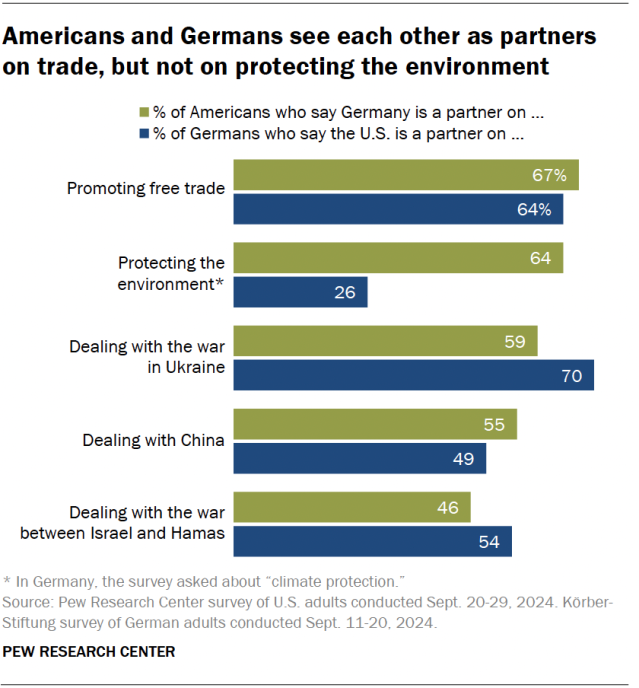
Americans and Germans largely view one another as partners on common goals. For example, about two-thirds of Americans and Germans view the other nation as a partner in promoting free trade.
But there is one notable exception: protecting the environment.
Of the five goals we asked about, Germans are least likely to see the U.S. as a partner on environmental protection. About a quarter (26%) say the U.S. is a partner on this goal, compared with about half or more who say this for the other goals we asked about. And 71% of Germans say the U.S. is not a partner on protecting the environment.
Germans are most likely to see the U.S. as a partner when it comes to dealing with the war in Ukraine – seven-in-ten recognize a partnership on this issue.
Among Americans, a majority view Germany as a partner on all goals we asked about except handling the war between Israel and Hamas, where 46% say Germany is a partner. There are partisan differences on this issue: 56% of Democrats and 40% of Republicans view Germany as a partner in dealing with the war.
There are also partisan divisions on the goal of dealing with China. About two-thirds of Democrats (66%) view Germany as a partner in this, compared with half of Republicans.
In Germany, there are similar divisions on some of the goals we asked about:
- On nearly all issues, majorities of AfD supporters say the U.S. is not a partner. The exception is free trade, where views are divided: 44% of AfD supporters consider the U.S. a partner and 48% say the opposite.
- When it comes to handling the Israel-Hamas war, 59% of West Germans say the U.S. is a partner, while only about of a third (34%) of East Germans agree.
Perceptions of global threats
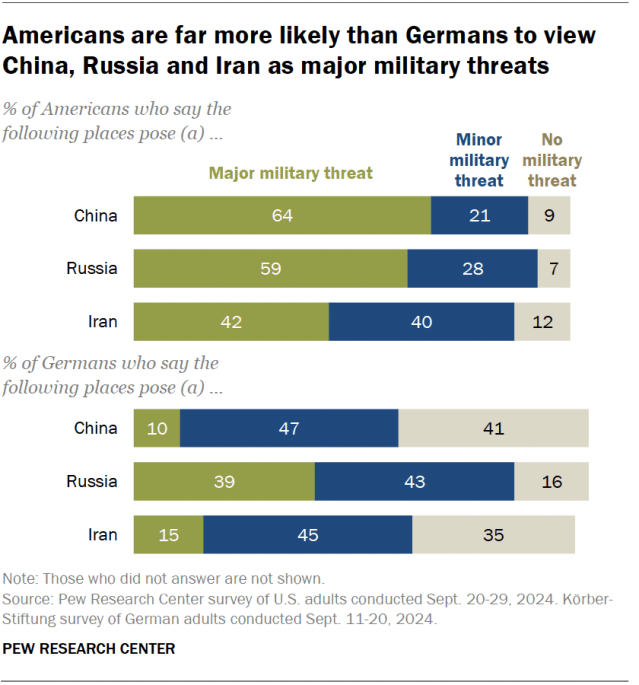
Americans are far more likely than Germans to see China, Russia and Iran as military threats to their country:
- China: 64% of Americans say China is a major military threat, while only 10% of Germans agree.
- Russia: Americans are 20 points more likely than Germans to see Russia as a military threat (59% vs. 39%). This is despite Germany’s relative proximity to the Russia-Ukraine conflict.
- Iran: Americans are almost three times as likely as Germans to see Iran as a military threat (42% vs. 15%).
On the other hand, more Germans than Americans say these countries pose no military threat.
Looking at differences among Americans, older adults are much more likely than younger ones to see all these countries as major military threats. Americans with a bachelor’s degree or more education are also more likely than those with less education to say this.
In terms of partisan affiliation, Republicans and those who lean Republican are more likely than Democrats and Democratic leaners to see China and Iran as major military threats. However, supporters of both parties have similar views of Russia.
Since last year, fewer Americans say China and Russia are major military threats. German sentiment is little changed.
Views of China
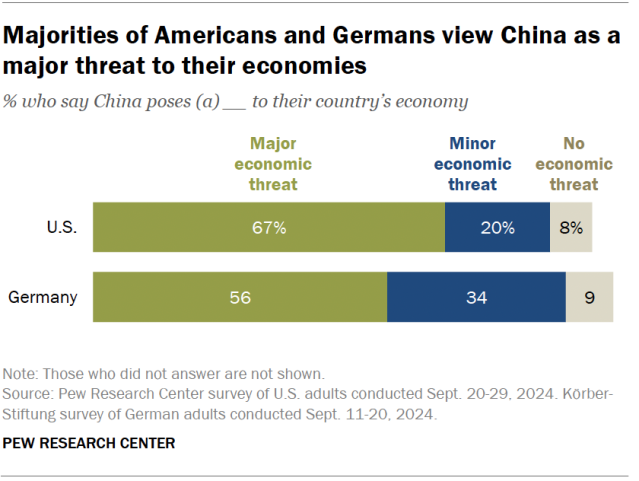
Germans are more concerned about China from an economic perspective, and their concern has grown in the past year. Today, 56% of Germans say China is a major economic threat to their country. In 2023, 49% said this.
Two-thirds of Americans also continue to see China as a major economic threat. This is similar to the share who say China is a major military threat.
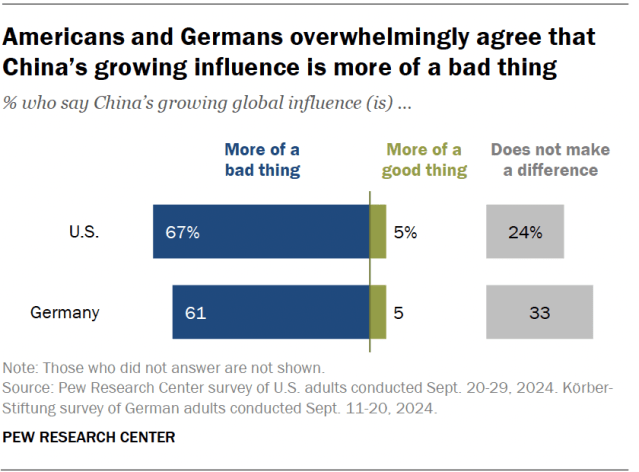
As with views of China as a military threat, older Americans are more likely than younger Americans to say China poses a major economic threat. Republicans and Americans with higher incomes are also particularly likely to say this.
Meanwhile, Germans and Americans agree that China’s growing influence in the world is more of a bad thing than a good thing. Two-thirds of Americans and 61% of Germans say this.
Views of the Russia-Ukraine war
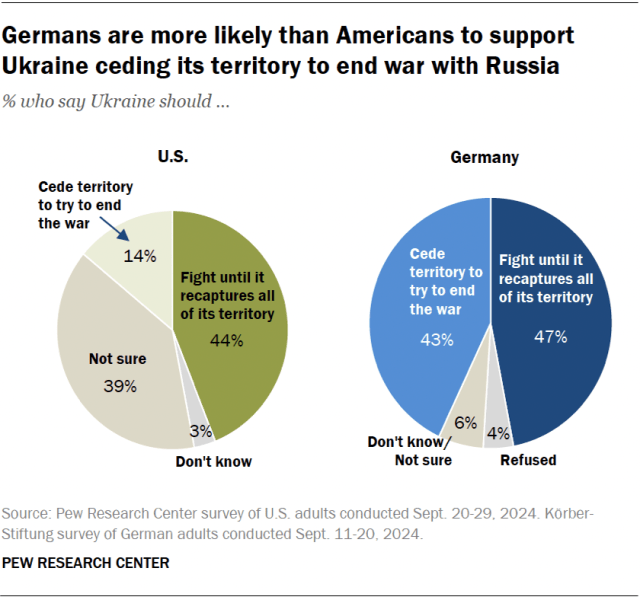
People in the U.S. and Germany are more divided about the Russia-Ukraine war. Similar shares in each country say Ukraine should continue to fight, but there are disagreements over the alternative.
In Germany:
- 47% say Ukraine should continue to fight until it has recaptured all land lost from Russia
- 43% say Ukraine should cede territory to end the war
- 6% aren’t sure
However, there are differences among Germans by political party in support for Ukraine to keep fighting. Only 21% of AfD supporters want Ukraine to continue to fight, compared with 57% of supporters of the center-left Social Democratic Party (SPD) and 51% of supporters of the center-right CDU/CSU.
In the U.S.:
- 44% say Ukraine should continue fighting
- 14% say Ukraine should cede territory to Russia to end the war
- 39% are unsure
Democrats are more likely than Republicans to support Ukraine continuing to fight, although Republicans are also more likely to be unsure.
Changes in influence of the European Union
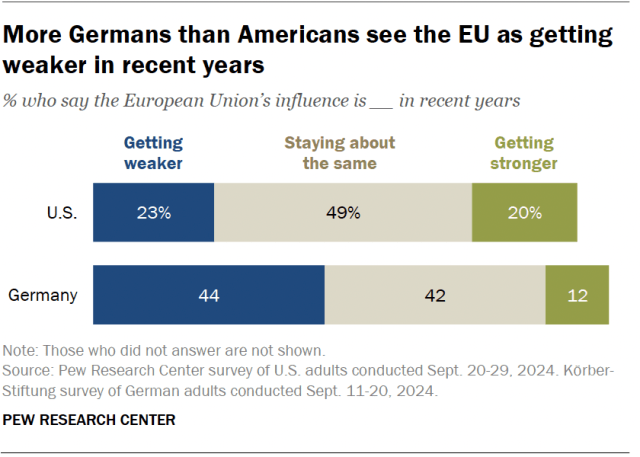
Germans are much more pessimistic than Americans about the European Union’s global influence. In the U.S., 49% say the EU’s influence has stayed about the same in recent years. Another 23% say it’s getting weaker, and 20% say it’s getting stronger.
In Germany, however, respondents are split between saying the EU is getting weaker (44%) and staying about the same (42%). Only 12% say the EU’s influence has gotten stronger.
Among Americans, there are also partisan differences. Democrats are more likely than Republicans to say the EU’s influence has grown or stayed the same, while Republicans are more likely to say its influence has weakened.
Note: Here are the questions used for this analysis, along with responses, and the U.S. survey methodology.

